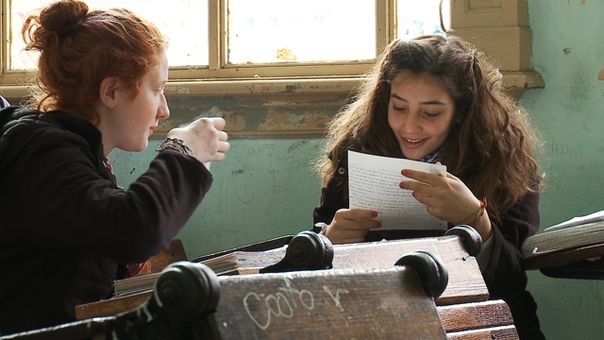Fiction by Design
Berlinale Forum entry NORMAL SCHOOL documents reality with such neat precision that it feels scripted. The result is stimulating.

Celina Murga's NORMAL SCHOOL
Celina Murga's Berlinale Forum film NORMAL SCHOOL (ESCUELA NORMAL, Argentina) tries to capture the restless, tumultuous, and abrasive political landscape of modern Argentina. It ignores the actual politicians and media figures, choosing to focus instead on the upstarts, the youngsters and teenagers who are just learning about the perils of the democratic process through student elections. Through their arguments, alliances and rivalries, these kids are both the future of the country and also its past, fresh-faced versions of the dinosaurs who already run the State. The contradictory shadows of revolution and cyclical monotony dance across their concerned faces.
Murga has crafted a documentary so dominated by interactions, dialogues and characters that it actually feels scripted. The words are almost too precise and the moments too revealing. The kids cannot help but exude a certain self-consciousness, perhaps because performance is not just the stuff of films but of life itself. People regularly adopt characters, react according to context, and talk to the improvised audience of their friends. Observed by a camera, the kids in NORMAL SCHOOL are both themselves and performances of themselves – a duality heightened by the student elections they’re involved in. Politics is performance, as the film perhaps unconsciously suggests.
By design, NORMAL SCHOOL moves like a fiction. Every conversation and scene, even down to individual shot compositions, looks just slightly rehearsed. The camera isolates individual faces as they speak, follows a faculty member down several hallways and finds plenty of anecdotal treasures and little details. Murga has carefully selected her footage and edited it to the rhythm of a fictional drama. There are no interviews and, outside of a few passing glances at the camera, the fourth wall is almost never broken. If many films of the Argentine New Wave are fictions that look like documentaries – from LA CIÉNAGA to CRANE WORLD, BOLIVIA and LION’S DEN – then NORMAL SCHOOL is the opposite, a documentary that reaches towards fiction.
Together, these films exist in a murky middle ground where fiction and documentary mix and cross-pollinate. This middle ground is storied and old, going back to the roots of cinema. As Jacques Rancière points out, film is the battleground of a perpetual conflict: on the one side, fictional, narrative structures; and on the other, the documentary fact captured and indexed by the filmed image. In this view, all films – except, perhaps, for fully animated features – are both documentaries and fictions. Even digital extravaganzas like AVATAR cannot avoid the wounds of battle, nor can the most unadorned documentaries, which will still have fictional exoskeletons around them. Some movies prefer to ignore the conflict, while others do something interesting with it. NORMAL SCHOOL belongs to the latter group.


301 Moved Permanently